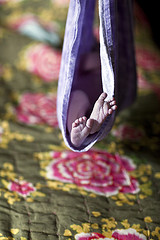
The so-called “mommy wars” have apparently made it all the way to the delivery room, according to Jennifer Block, writing for Slate:
For a long time home birth was too fringe to get caught in this parenting no-fly zone, but lately it’s been fitting quite nicely into the mommy war media narrative: There are the stories about women giving birth at home because it’s fashionable, the idea that women are happy sacrificing their newborns for some “hedonistic” spa-like experience, or that moms-to-be (and their partners) are just dumb and gullible when it comes to risk management…
For many parents, home birth is a transcendent experience. …Yet as the number of such births grows, so does the number of tragedies—and those stories tend to be left out of soft-focus lifestyle features.
Debates about home birth have erupted in the media and the blogosphere in recent months, largely focused on the relative risks of home birth versus hospital birth. But at the heart of the issue is who, and what evidence, to trust.
I could list several recent large prospective studies… all comparing where and with whom healthy women gave birth, which found similar rates of baby loss—around 2 per 1,000—no matter the place or attendant. We could pick through those studies’ respective strengths and weaknesses, talk about why we’ll never have a “gold-standard” randomized controlled trial (because women will never participate in a study that makes birth choices for them), and I could quote a real epidemiologist on why determining the precise risk of home birth in the United States is nearly impossible. Actually, I will: “It’s all but impossible, certainly in the United States,” says Eugene Declercq, an epidemiologist and professor of public health at Boston University, and coauthor of the CDC study that found the number of U.S. home births has risen slightly, to still less than 1 percent of all births. One of the challenges is that “the outcomes tend to be pretty good,” Declercq says…But to really nail it down here in the U.S., he says, we’d need to study tens of thousands of home births, “to be able to find a difference in those rare outcomes.” With a mere 30,000 planned home births happening each year nationwide, “We don’t have enough cases.”
And, as sociologist Barbara Katz-Rothman notes, decisions about where to give birth are likely made more on the basis of perceived, rather than real, risk.
“What we’re talking about is felt risk rather than actual risk,” explains Barbara Katz-Rothman, professor of sociology at the City University of New York and author of much scholarship on birth, motherhood, and risk. Take our fear of flying. “Most people understand intellectually that on your standard vacation trip or business trip, the ride to and from the airport is more likely to result in your injury or death than the plane ride itself, but you never see anybody applaud when they reach the airport safely in the car.” The flight feels more risky. Similarly, we can look at data showing our risk of infection skyrockets the second we step in a hospital, “but there’s something about the sight of all those gloves and masks that makes you feel safe.”

